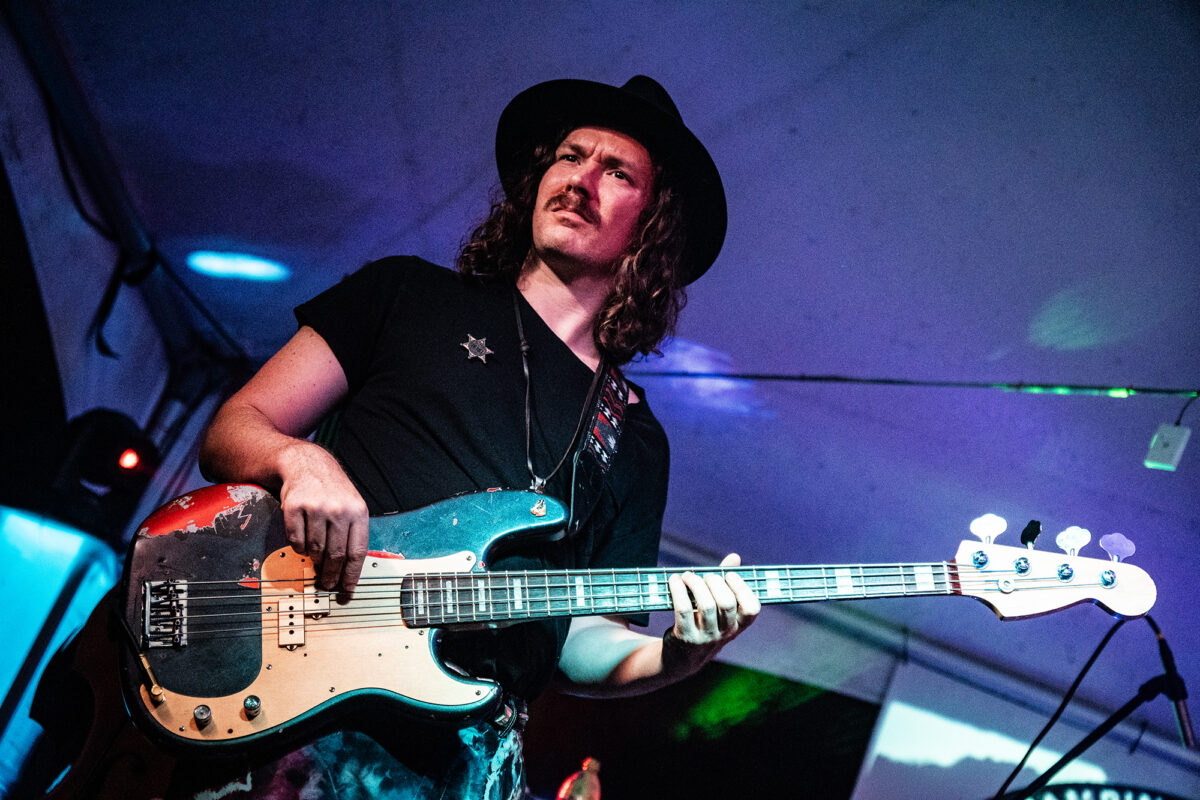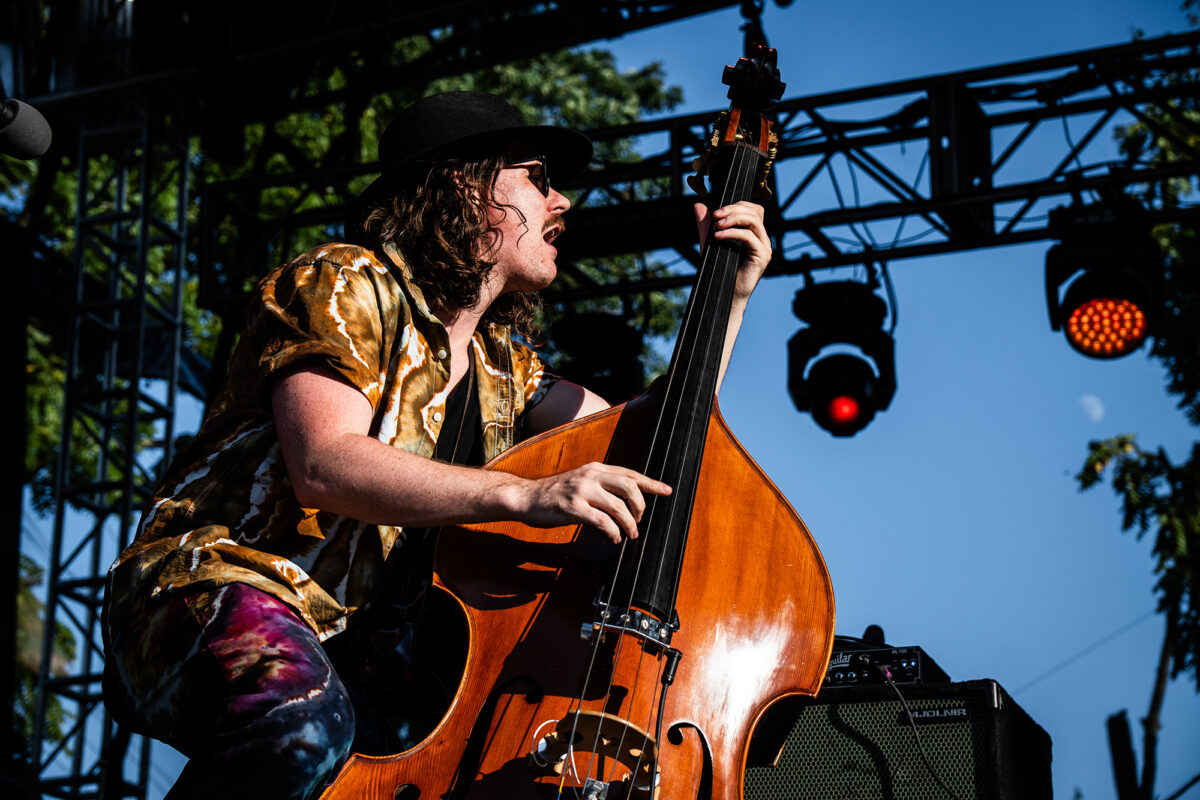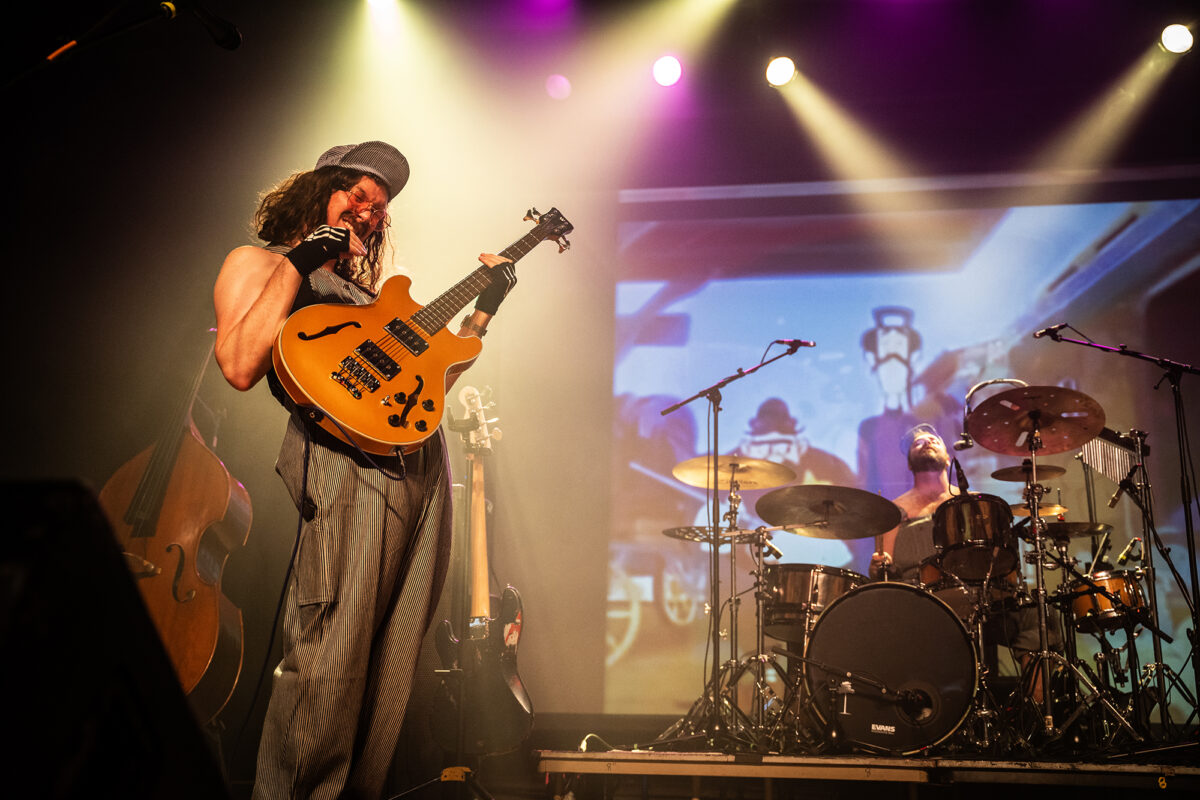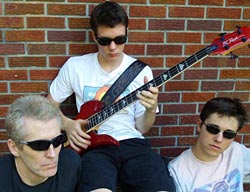Cosmic Country: An Interview with Will “Mustang” McGee

As part of Daniel Donato’s Cosmic Country, Will “Mustang” McGee has been all around the U.S. to share the group’s awesome blend of country rock jams. Taking cues from bands the Flying Burrito Brothers and the Grateful Dead, the band has been amassing a loyal following city by city.
McGee is a big part of what makes the band tick. He’s a perfect fit for the band thanks to his rock solid groove and tasteful fills, which can be attributed in part to his deep knowledge of bass history. Born in Memphis, he began on bass as a youngster and was quickly turned onto bass heroes, particularly the session legends like James Jamerson, Willie Weeks, and Chuck Rainey. It’s from this old school perspective that he approaches the bass and supports all of the projects he’s worked on.
We caught up with McGee to talk about the grind of working in Nashville, his bass gear and influences, and how Cosmic Country got to be such a cohesive band.
Daniel Donato’s Cosmic Country’s latest album, Reflector, is out now on vinyl and streaming via iTunes, Amazon, and more.
Besides it being Music City, what brought you to Nashville?
I moved up from Memphis in 2012 to go to Belmont University and study music there. I got to study with Roy Vogt and Adam Nitti and Viktor Krauss on Upright. Those were really fun upright lessons.
I would love to pick his brain. What were lessons with him like?
It was so much fun. I remember before he joined the program as an adjunct professor, he came by and did a workshop with us. I had been playing upright since high school and I had been getting better at it, but the way he played [made me think], “That’s what I want to play.”
He doesn’t really play jazz and he doesn’t necessarily do bluegrass either, even though he plays with Jerry Douglas and people like that. He’s perfectly capable of any of that stuff. He’s in this middle zone and our lessons would be a lot like that. It was late in that program, probably my senior year that I was studying with him and they were very cerebral lessons. We weren’t working on scales and modes and situations like that. He would put on a Fleetwood Mac song that had no bass on it and say, “What would you play?” Then we would just work on that question: what do you play? That’s like a big part of where I come from, too, where I’m working on original music so much that it’s not so much trying to get down the repertoire. The question is always “What should I play? What should I do?” I’ve just tried to work on things from that angle and he was a big part of that.
And his tone is just so good. I definitely have taken a lot from him in terms of putting a lot of apparatuses on the upright, trying a lot of different setups and just continuing to dial that in. It’s not an orchestral instrument at a certain point, depending on the situation you’re trying to involve it in. I’ve got to compete with drums a lot, so I’ve just have always been trying little upgrades along the way to pump that up as much as I can and get that kind of sound.
What kind of things have you found are working for you?
My latest setup is the Fishman Full Circle, which is a piezo pickup, and the Krivo electromagnetic pickup. I’m blending both of those through a Grace Designs Felix II. The guys in the Kitchen Dwellers are the ones that actually got me on the Felix because every single one of them had that on their board and they’re all playing acoustic instruments. I just recognize that as like a new tool for bluegrass guys because it works great for everything.
Since I have the Krivo, I’m starting to get into running effects in that signal chain since it’s basically just a big P-Bass pick up. I’ve just barely began the foray into that whole thing. I got really inspired seeing how much stuff Joe Funk from the Kitchen Dwellers puts on his bass. He’s able to do live, but he’s on one of those hybrid acoustic-electric bass upright kind of situations, whereas mine is a full three quarter scale size. With the resonance and feedback, it’s like instant death if you start putting effects on that in the wrong way.
Kudos to you for taking a full upright plus an electric bass on the road.
Yep. The pile of gear only grows and grows as you go. This run we’re about to go on is the first time I’m taking out a new Sadowsky 5-string. I’ve had a couple different basses. This is the first tour where I think I’m going to leave my main bass at home and try my other stuff out.
I’ve had my main bass for like 20 years and you can see I painted it. It says Maria right here. I did that when I was like 15. I’ve been playing it for the first couple of years of Cosmic Country, but I just got this Sadowsky that I’m excited to take out.

What is your main bass, exactly?
It used to be an out-of-the-box bass-with-the-combo-amp Squire that your parents get you when you tell them that you want to start playing bass. I’ve modified it so it is a partscaster, so basically the only thing Squire left is this body and the screw plate.
I’ve changed out all the electric components and the pickups. The neck is from Warmoth because I wanted the block fret markers on there. And you can see like all this relic is cause I did such a bad job painting it when I was a kid. I painted it with an iridescent car paint and you can kind of see it goes purple to green, but it’s so old now that it doesn’t really do that as much anymore. It’s just an ambiguous smoky purple color.
That’s cool though, you put the mojo on it.
Yeah, I love that. I think it’s really important to have a long-term relationship with one instrument. It’s only been this year that I’ve gotten a couple of new basses, but most of my basses I’ve had for at least 12 years. .
I know where everything is on this bass. It’s been with me everywhere. It’s easy to find the music.
When you get that special relationship it’s just like an extension of yourself, right?
Pretty much, yeah. I think me and Daniel and Nathan (aka Sugar), we all have like an instrument like that we’ve just had since the beginning kind of and have that kind of relationship with one. So damn, now I kind of want to pack this one up and bring it with me!
I’m wondering how you find Nashville. You’ve been there 12 years. You came in like as a student, so do you feel like it bakes you into the music community right away?
Yeah, I think you have that opportunity for sure. There’s also kind of a college bubble that you can exist inside of for a while. That’s really good in a networking sense to get with your peers and focusing on growing.
But then you get released out onto the population and you’ve got to go find work. A lot of my college peers and classmates are people I still play with today and interact with, but a big reason why I picked this school all those years ago was because it was in Nashville. I liked the city that was around it and how much music it had going on. You sharpen your skills [at Belmont] and then you go out into [Nashville] and look for opportunities. You will definitely get humbled a couple of times along the way while you’re trying to find the right thing. But yeah, I mean, I’ve just loved it in Nashville.
There are so many people here trying to create original music. Even though you can treat it like a bar band town… You could just be a working guy if you really want to, but there’s also a lot of people trying to create something. So I really enjoy that.
What kind of advice would you have for someone that’s coming into the city? Daniel and Cosmic Country are really taking off, but you’d been there a solid decade before that. How were you surviving?
I played in a lot of bands. I mean, I had a lot of bands in college and being a bass player in that kind of environment, you’re just so useful that everyone is asking you to get involved. By the end of my first year of college, I was in nine different bands and rehearsing or getting ready for something all the time. That’s when I really had to take a look and say, “Okay, what are the three or four things out of all these things that I really am excited about?”
I try to keep switching situations like that out. I also am a singer and a songwriter. I went from the side guy role and started fronting a band for a while called Forest Fire Gospel Choir. That started I think in 2013 or 2014.
We did a bunch of shows around Nashville just in the rock scene. We were really focusing on writing and recording and developing a sound. It was a really committed, great band with great musicians. We had everything in it: band drama, great songwriting, crappy shows, great shows and a little bit of touring experience.
I did that right out of college. Right out of college I also started playing down on Broadway, where I got roped into a situation.
I was very green where this guy… Ugh, this was so bad. This guy was like, “Hey man, I’ll give you $1,800 at the beginning of the month, every month, if I can just like have your availability for whatever Broadway shows that I have going.” That sounded great to me right out of school. He just milked that to the maximum where we were playing six shows a week on Broadway, doing double shifts. Those are all four hour long shows. I did that for almost a year. It was a great experience in one sense, just gigging that much and that consistently. I was singing a lot, too. I just thought of it like practice, but it took me a little while to catch on like, “Oh man, I’m really giving it away.” It took another great Nashville bass player, Clark Singleton, [to make me realize]. He came up to me and said “Dude, do you realize how much money you’re leaving on the table in this situation?”
But that was just my learning curve. I had no idea. So that steered me back towards my original priorities, which it felt great to just be working in music. But then I was like, I just need to focus on the growing something and the originality. And like that’s. I’ve had plenty of crappy jobs on the side of that, too. Washed dishes, waited tables, worked on houses, any little odd job I could just keep the lights on. I was not above it at all. That’s what I had to do. But it took me a while to grow the reputation with my peers to be able to start to put together more and more gigs that I could rely on.
It takes time to get yourself out there. You just have to always be developing the original music side of things so when you step into a situation you can provide to the music in that way instead of learning an exact part from a chart. Some people want you to do that, but I think there’s a lot of value in showing them what you can bring to it. It’s the classic bass player thing of trying to bring yourself to the music without making it about yourself.
I guess the advice I would give anyone trying to make music if they’re go to Nashville is to focus on getting three great kinds of sets. You need like a great 45 minute set, a great hour long set and a great 90 minute set. Make those with your own music as much as possible and songs you’re really proud of plus a couple of covers. You want more of your own music than covers if you can help it in that situation.
Nashville for a band scene is kind of a giant incubator because every show you go to, the audience is other musicians. So it’s as if you were a comedian and you were doing comedy for a room full of comedians – you’re not getting the biggest laughs, but you’re getting a lot of people paying attention.

Nashville is where you connected with Daniel Donato and the rest of Cosmic Country and now it seems like you all are working all the time.
Yeah, it’s about 140 to 150 something shows a year so far.
Do you think that keeping so busy is the key to getting your band so tight or is there a lot more communication in your group?
It’s both. You definitely have to have the repetition. There’s an athleticism to it. A basketball team that plays together regularly is going to have way more chemistry than a bunch of guys who just randomly assembled because you have to react off people in a different way when you don’t quite understand them. Everyone’s working together in a certain way. Whereas when your chemistry is better known, you will have these telepathic moments where everyone lines up on a fill somehow, some way and just looks at each other and it’s like, “Oh, that was it.”
That comes out of the repetition and it almost becomes a vocabulary of music. You hear certain things and you know their licks, they know your licks. That’s a kind of communication when those things come up and that’s kind of unspoken, but also there’s a lot of verbal communication and goals laid out. That also develops a shorthand to a certain extent.
You know, we have such good players. We don’t need to walk anyone through step by step or what they need to be doing, necessarily, so we can just talk in these broad strokes or shorthand kind of ways that communicate our ideas together.
You were talking about the lesson with Viktor Krauss about just having a song play and figuring out what you would do. I know you’ve got such a big background, you’re schooled, but also I just know that you are familiar with all the bass greats and you have big ears for bass in music. When you are presented with these songs, who are you drawing from? What kind of things are you doing when you’re creating your bass lines? Are you thinking, “What would Chris Hillman do?” or are you just bringing just whatever you’re feeling?
That’s definitely one part of the equation: “first thought, best thought.” You put the time in on your instrument, so your first thought should hopefully be pretty good and at least 70% close to the zone that it needs to be.
But sometimes I’ll put two really broad ideas together and say, “I want this to be like this mixed with this.” Maybe someone will give me a new song to work on and I’ll think to myself, “I want this to be like if Barry Oakley from the Allman Brothers was playing for Marvin Gaye” or something like that. I’ll often juxtapose two references in my mind and those kind of references just pop into your head as soon as you like hear something.
I’ll propose something to myself like that internally and then start putting that together. I like sharing that sometimes, too, but that’s not even always the best way because that can put a limitation on someone else or just not quite be where they’re coming from. But sometimes the disagreement of those two things is where interesting ideas could happen that you weren’t expecting rather than just be your marching orders on how this song goes.
I don’t know, I just try to be reactionary. I take a lot of influence from Willie Weeks and Chuck Rainey. I just put this iconic bass player playlist together for myself the other day. It was fun going back through like all the songs I remembered being iconic to me when I was growing up in terms of great bass playing. Right now I’m trying to research that a little more, too. The main guys I love are going to be like the sixties R&B and late sixties and seventies rock and soul, blues guys.
I always like really liked things in the band context too. Like Joe Cocker’s Grease band or Elvis’s band. Great performers backed up by great bands. I started out obsessed with the session players though, players like Chuck Rainey and James Jamerson and Willie Weeks. I always have flatwounds on my bass, so I carry those guys with me in that sense. I have that vintage need for things. I’m not so modern in my influences. I’m like that old school tape and tube dude.
It seems that’s the heart of a lot of what’s going on right now in music. Everyone is discovering (or remembering) all this great music from the past. The amount of people who have become James Jamerson fans or Jerry Jemmott fans just because we know about them now is awesome.
Yeah. The age of information is, is definitely real. I think that all the time that information is so accessible that the fact that something could be new or old is kind of a moot point. Because it’s right there. If I want to go find everything that James Jamerson ever played on, it’s right there. And it’s the same if I look up Pino or anyone else. So then you just get to be discerning about what you like, just cherry picking that out and focusing on that. At a certain point, it’s good to be really broad on what influences you, but also at a certain point you specialize and you figure out what you’re good at and try to specialize in that. Bass players, I think, have to be a little more versatile than some.
I’ve tried to specialize more in this old school kind of thing with this finger playing kind of thing. I’ll also play with a pick a lot more now, which I do a lot when I’m singing. I’ll play with a pick a lot just to simplify in that sense.
Getting back to Cosmic Country’s busy schedule, are you a road dog? Do you really enjoy it or is it just something you have to do?
It definitely suits my style. I’m a “get to the next objective” kind of a person sometimes and touring is good for that. It is just life as simplified as it could be.
So I like being on the road a lot. I love being at home, too, but I love getting out in front of people and playing. It’s something that’s very special to me. Being able to go around and do that for so many different people is a joy and a privilege. And we get to do that a lot with Cosmic Country.
How have the shows been growing or evolving lately?
You get a real sense of like the work we’ve put in to getting out in front of people by coming through a couple of different cities multiple times over the years. I feel like every time we go back to somewhere we were last year or something, you just see this like huge growth and how many people are showing up.
I definitely have seen the community grow a lot and there’s something about being cosmic that draws people together. Like they really, they really love that. I try to pay attention to who is around and what the crowd is like. I’m always with the crowd. I feel that’s one of my roles in the whole thing. I’m always with the crowd while my two guys over here are just stratospherically in the stars on some jam. That’s rhythm section way, though. I’m trying to create things that are making them respond and dance and move. And so I’m with them like that.
One of the coolest things is seeing people become friends. There are people who travel to multiple shows and will drive hundreds of miles. It’s just really funny. I’ll be talking to two people after the show and I’ll realize like, “Wait, I know you from North Carolina and I know you from Brooklyn, New York and you guys are friends now.” That’s so crazy that something we’re doing on this little platform caused two people who live hundreds of miles apart to become friends and have something in common. It’s incredible watching that grow.


I would like to see more videos of top modern country bass players. Thanks guys